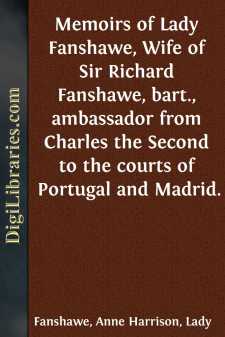Categories
- Antiques & Collectibles 13
- Architecture 36
- Art 48
- Bibles 22
- Biography & Autobiography 813
- Body, Mind & Spirit 142
- Business & Economics 28
- Children's Books 15
- Children's Fiction 12
- Computers 4
- Cooking 94
- Crafts & Hobbies 4
- Drama 346
- Education 46
- Family & Relationships 57
- Fiction 11828
- Games 19
- Gardening 17
- Health & Fitness 34
- History 1377
- House & Home 1
- Humor 147
- Juvenile Fiction 1873
- Juvenile Nonfiction 202
- Language Arts & Disciplines 88
- Law 16
- Literary Collections 686
- Literary Criticism 179
- Mathematics 13
- Medical 41
- Music 40
- Nature 179
- Non-Classifiable 1768
- Performing Arts 7
- Periodicals 1453
- Philosophy 64
- Photography 2
- Poetry 896
- Political Science 203
- Psychology 42
- Reference 154
- Religion 513
- Science 126
- Self-Help 84
- Social Science 81
- Sports & Recreation 34
- Study Aids 3
- Technology & Engineering 59
- Transportation 23
- Travel 463
- True Crime 29
Memoirs of Lady Fanshawe, Wife of Sir Richard Fanshawe, bart., ambassador from Charles the Second to the courts of Portugal and Madrid.
Description:
Excerpt
There is a deathless charm, despite the efforts of modern novelists and playwrights to render it stale and hackneyed, attaching to the middle of the seventeenth century—that period of upheaval and turmoil which saw a stately debonnaire Court swept away by the flames of Civil War, and the reign of an usurper succeeded by the Restoration of a discredited and fallen dynasty.
So long as the world lasts, events such as the trial and execution of Charles Stuart will not cease to appeal to the imagination and touch the hearts of those at least who bring sentiment to bear on the reading of history.
It is not to the dry-as-dust historian, however, that we go for illuminating side-lights on this ever-fascinating time, but rather to the pen-portraits of Clarendon, the noble canvases of Van Dyck, and above all to the records of individual experience contained in personal memoirs. Of these none is more charmingly and vivaciously narrated or of greater historic value and interest than the following memoir (first published in 1830) of Sir Richard Fanshawe, "Knight and Baronet, one of the Masters of the Requests, Secretary of the Latin Tongue, Burgess of the University of Cambridge, and one of His Majesty's Most Honourable Privy Council of England and Ireland, and His Majesty's Ambassador to Portugal and Spain." It was written by his widow in the evening of her days, after a life of storm and stress and many romantic adventures at home and abroad, for the benefit of the only son who survived to manhood of fourteen children, most of whom died in their chrisom robes and whose baby bones were laid to rest in foreign churchyards.
Two contemporaries of Lady Fanshawe, Mrs. Hutchinson and the Duchess of Newcastle, also wrote lives of their husbands, which continue to live as classics in our literature. But the Royalist Ambassador's wife is incomparably more sparkling and anecdotic than the Puritan Colonel's, and she does not adopt the somewhat tiresome "doormat" attitude of wifely adoration towards the subject of her memoir which "Mad Margaret" (as Pepys called her Grace of Newcastle) thought fitting when she took up her fatally facile pen to endow her idolised lord with all the virtues and all the graces and every talent under the sun.
Yet with less lavishly laid on colours, how vivid is the portrait Lady Fanshawe has painted for posterity of the gallant gentleman and scholar, one of those "very perfect gentle knights" which that age produced; loyal and religious, with the straightforward simple piety that held unwaveringly to the Anglican Church in which he had been born and brought up.
And of herself, too, she unconsciously presents a series of charming pictures. The description of her girlhood is a glimpse into the bringing up of a Cavalier maiden of quality, of the kind that is invaluable in a reconstruction of the past from the domestic side. In the town-house in Hart Street which her father, Sir John Harrison, rented for the winter months from "my Lord Dingwall," where she was born, her education was carried on "with all the advantages the time afforded." She learnt French, singing to the lute, the virginals, and the art of needlework, and confesses that though she was quick at learning she was very wild and loved "riding, running and all active pastimes."
One can picture the light-hearted "hoyting girl" breaking loose when she found herself at Balls in Hertfordshire, where the family spent the summer, and skipping and jumping for sheer joy at being alive....


